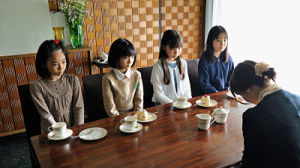STUDIO: Doppelganger/Music Box | DIRECTOR: Kiyoshi Kurosawa | CAST: Kyoko Koizumi, Yu Aoi, Eiko Koike, Sakura Ando, Teruyuki Kagawa
RELEASE DATE: 12/9/14 | PRICE: DVD $29.95, Blu-ray $34.95
BONUSES: interviews with performers and filmmaker Kurosawa
SPECS: NR | 300 min. | Foreign language thriller | 1.77:1 widescreen | Dolby Digital 2.0 | Japanese with English subtitles
Filmmaker Kiyoshi Kurosawa (no relation to Akira) is a master at transforming genre movies into haunting character studies. In 2012’s Penance, he turns a piece of popular fiction that is both a crime thriller and a “woman’s novel” into a moving tale of loneliness and loss as well as a pungent meditation on Japanese codes of honor.
A five-part TV miniseries, the film finds arthouse favorite Kurosawa delivering a “commercial” effort that is still a highly personal work. He structures the piece beautifully, so that part of the first episode and all of the last episode revolve around the main crime, and the remaining time is spent on the adult lives of the four little girls who witnessed it.
The crime in question is the assault and murder of a girl whose mother, Asako (Kyoko Koizumi), is livid at her daughter’s four friends for not being able to remember what the murderer looked like. She demands a “penance” from the girls, and we watch as they each grow up and experience doomed relationships. In the final episode, the mother pursues a vital clue to the murderer’s identity and uncovers a tangled series of coincidences that are worthy of a Greek tragedy.

From left, Kyoka Shibata, Manatsu Kimura, Erika Omata and Asumi Kikuchi, and right, Kyoko Koizumi, in Penance.
The most impressive thing about the series is that Kurosawa gives each episode a different tone befitting its plotline. Each woman’s story is equally tragic, with some reacting violently to the injustice they uncover, while others cause injustice themselves. Thus the visuals are superbly moody, as is the music — this might be the only Japanese film you’ll see this decade with a stirring bagpipe solo on the soundtrack.
Kurosawa has long been the polar opposite of cult favorite Takashi Miike. Where Miike depicts explicit violence, Kurosawa crafts sequences that are quietly suspenseful or disturbing. One is reminded very specifically of Park Chan-wook’s Sympathy for Lady Vengeance, another tale of a complicated revenge being enacted for the death of children. But the plotline of Penance is less about violent acts and more about the ways in which people torment each other psychologically and emotionally. It also examines how the Japanese allegiance to notions of honor imprisons those who follow it.
The sequence that illustrates this best is the seminal moment (present in all five episodes) in which Asako warns the little girls about a need for “penance” to make up for her daughter’s murder. At this point Asako seems like a monster, furious at children who have lost their memories of a traumatic event.
As the series continues, Asako interacts with the girls (now young women) again in a number of modes, acting heartless to some and sympathetic to others. It is only in the last episode that she becomes a three-dimensional woman who has suffered a grievous penance herself.
Koizumi does a splendid job incarnating Asako in her many guises. All of the featured performers distinguish themselves, especially the four young women playing the proposed “penitents,” who seem as haunted by Asako’s pronouncement as they do by the knowledge that they didn’t prevent their friend’s death.
The series thus functions as both great cinema and compulsively watchable television. The two-disc package includes short interviews with the lead actresses and Kurosawa. He notes his initial hesitation about adapting a popular novel, but adds with characteristic understatement that he thinks the results are “quite satisfactory.”
|
Buy or Rent Penance
|
|||
|---|---|---|---|
 |
 |
||
Leave a Reply